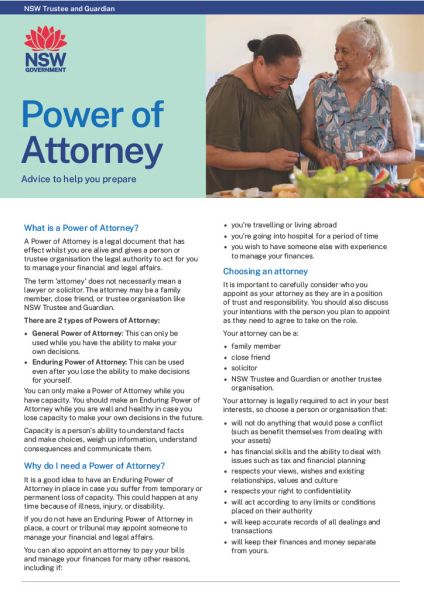About Power of Attorney
A Power of Attorney is a legal document allowing someone to make legal and financial decisions for you. There are 2 types of Power of Attorney documents:
General Power of Attorney
A legal document that allows you to appoint a person to manage financial and legal decisions on your behalf, only while you have the ability to make your own decisions. A General Power of Attorney becomes invalid when you die, or you lose capacity to manage your own affairs.
Enduring Power of Attorney
A legal document that allows you to appoint a person to manage financial and legal decisions on your behalf and continues even if you lose the ability to make decisions for yourself. It also becomes invalid when you die.
A Power of Attorney is only valid during your lifetime. After death, your Will comes into effect.
It's a good idea to have a Power of Attorney in place in case something happens to you and you suffer from temporary or permanent loss of capacity.
This could happen at any time because of illness, injury or disability.
If you don't have a Power of Attorney in place, a court or tribunal may appoint someone to manage your finances under a financial management order.
You can also appoint an attorney to pay your bills and manage your finances for many reasons, including if:
- you're travelling or living abroad
- you temporarily or permanently lose capacity through illness, injury or disability
- you wish to have someone else with experience to manage your finances.
You can use a Power of Attorney for almost any financial purpose including:
- signing legally binding documents
- operating bank accounts
- paying bills
- buying and selling real estate
- managing investments
- collecting rent.
In NSW, an attorney can only make financial and legal decisions.
You can appoint an Enduring Guardian to make accommodation, healthcare, lifestyle and medical decisions for you.
You can use a Power of Attorney for almost any financial purpose including:
- signing legally binding documents
- operating bank accounts
- paying bills
- buying and selling real estate
- managing investments
- collecting rent.
In NSW, an attorney can only make financial and legal decisions.
You can appoint an Enduring Guardian to make accommodation, healthcare, lifestyle and medical decisions for you.
It's important to carefully consider who you appoint as your attorney as they're in a position of trust and responsibility.
Make sure they have the time and ability to take on the role and discuss your intentions with them as they need to agree to take on the role.
Your attorney can be a:
- family member
- close friend
- solicitor
- NSW Trustee and Guardian or a trustee organisation.
Your attorney is legally required to act in your best interests, so choose a person or organisation that:
- will not do anything that would pose a conflict (such as benefit themselves from using your money)
- has financial skills and the ability to deal with issues such as tax and financial planning
- respects your views, wishes and existing relationships, values and culture
- respects your right to confidentiality
- acts according to any limits or conditions placed on their authority
- keeps accurate records of all dealings and transactions
- keeps their finances and money separate from yours
- are of the age and capability to manage your affairs.
The requirements for witnessing a Power of Attorney differ depending on the type of Power of Attorney; whether it is general or enduring.
A General Power of Attorney (which ceases to be effective if you lose your mental capacity after it is executed) can be witnessed by anyone over the age of 18 years who is not an attorney appointed under the document.
There are more specific requirements for witnessing an Enduring Power of Attorney (which continues to be effective if you lose your mental capacity after it has been executed). An Enduring Power of Attorney can only be witnessed by one of the following:
- a solicitor or barrister
- a Registrar of the NSW Local Court
- a licensed conveyancer who has completed an approved course as required by the Powers of Attorney Act 2003
- a Legal practitioner qualified in a country other than Australia
- an employee of NSW Trustee and Guardian or a Private Trustee company who has completed an approved course as required by the Powers of Attorney Act 2003.
At the end of the Enduring Power of Attorney form there is certificate that must be completed by the witness. The certificate states that the witness:
- explained the effect of the Power of Attorney directly to you before it was signed
- was satisfied that you appeared to understand the effect of the Power of Attorney
- is not an attorney appointed under the Power of Attorney.
If the witness has doubts about your ability to understand what you are signing, they're required to take reasonable steps to confirm your mental capacity.
NSW Trustee and Guardian staff will only witness these documents when the document has been prepared by NSW Trustee and Guardian. NSW Trustee and Guardian staff are unable to witness documents that have been prepared elsewhere.
Registering your Power of Attorney
If you want your attorney to deal with any real estate you own in NSW, then the Power of Attorney document must be registered with the NSW Land Registry Services.
Otherwise, there is no requirement for your Power of Attorney to be registered. If you choose to register your Power of Attorney it:
- Will be on record as a public document.
- May be more easily accepted as evidence that your attorney has authority to deal with your property or financial affairs.
- After registration, your original document will be returned to you with a registration number stamped on it.
Your attorney should use this number when signing any documents on your behalf.
There is a fee charged by NSW Land Registry Services for registering your Power of Attorney.
If your Power of Attorney is registered and you later revoke it (cancel it), you should register the revocation.
Interstate Power of Attorneys
If an Enduring Power of Attorney was made in another State or Territory, it will be recognised in NSW provided that it is valid under the laws of the State or Territory it was made in and the powers could validly be given in NSW.
An Enduring Power of Attorney that is made in NSW may be valid in another State or Territory of Australia depending on interstate laws and recognition procedures.
An Enduring Power of Attorney made overseas is not recognised in NSW.
Storing your document
Store your original Power of Attorney document in a safe place so that doesn't get lost and it can be accessed when needed.
You need to make sure your attorney knows where to find the original Power of Attorney when its needed. You can store your original document with:
- your solicitor
- the person or organisation you've appointed as attorney
- You can also store your documents for a fee with NSW Trustee and Guardian.
Revoking or cancelling a Power of Attorney
To revoke or cancel a Power of Attorney, you should inform in writing (preferably via registered post):
- your attorney that you are bringing their appointment to an end
- your bank and any other relevant groups or businesses that may hold a copy of your Power of Attorney or that your attorney may have been dealing with
- NSW Land Registry Office (if registered).
If you don't do this, your attorney might legally continue to make decisions on your behalf.
You will also need to destroy the original and any copies of the Power of Attorney document.
You may wish to update or cancel your Power of Attorney for many reasons, including:
- your appointed attorney has passed away or lost decision-making capacity themselves
- your relationship with your attorney has changed
- your circumstances have changed and your attorney is no longer appropriate for the role (for example due to divorce or estrangement).
You can update or cancel your Power of Attorney at any time, providing you have the ability to make decisions for yourself.
NSW Trustee and Guardian as your attorney
Many people choose to appoint NSW Trustee and Guardian as their attorney because we're independent and impartial and provide a team of professionals experienced in all aspects of financial management and law to support you.
We can act as your attorney in a short or long-term arrangement and will tailor the level of assistance to suit your needs. View our Power of Attorney fees.
We offer 2 options to help you:
Future Assist provides you with a ‘safety net’ Power of Attorney option.
With this plan, you'll have the expert and immediate assistance of NSW Trustee and Guardian to safely manage your financial affairs should you be unable to do so in the future or should the unexpected occur.
Active Assist gives you the freedom to choose the exact level of assistance you need through a Power of Attorney.
You can use Active Assist to have NSW Trustee and Guardian manage your day-to-day financial tasks, including:
- collection of income
- payment of bills
- maintenance and management of property
- processing of health fund accounts
- investment of your surplus savings
- assisting you with portfolio reviews or tax returns
- buying and selling of real estate (including dealing with interests in retirement villages)
Fees will apply.
Resources
Learn more about making a Power of Attorney.
Power of Attorney guide
Our guide answers common questions about a Power of Attorney, including what a Power of Attorney is, why you should make a Power of Attorney and who you should choose.
Power of Attorney Factsheet
Our quick factsheet answers common questions about a Power of Attorney, including what a Power of Attorney is, why you should make a Power of Attorney and who you should choose.

Contact NSW Trustee and Guardian Wills
For Wills and estate planning enquiries, call:
1300 102 030 Monday to Friday from 9am-5pm.
More options to contact us.
